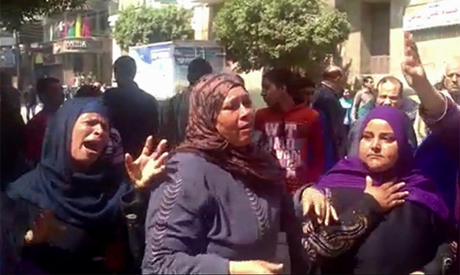
This image made from video shows relatives reacting after an Egyptian court on Monday sentenced to death 529 supporters of ousted Islamist President Mohammed Morsi in connection to an attack on a police station that killed a senior police officer in Minya, Egypt, Monday, March 24, 2014 (Photo: AP)
The judges who sentenced 529 people to death did not listen to the defence arguments, head of the defence team Khaled El-Komy told Al-Ahram's Arabic news website.
On Monday, the Upper Egyptian Minya criminal court sentenced 529 supporters of the Muslim Brotherhood to death on charges of murdering Mostafa El-Attar, deputy commander of the Matay district police station in Minya, during the riots that erupted in the aftermath of the forced dispersal in August of Islamist protest camps.
The court also acquitted 16 other defendants.
Lawyers, according to Komy, were not allowed to enter the court. Additionally, judges documented in the court records that the defendants were present, although this was not the case, he added.
Only 147 defendants were present at the hearing, while the rest are on the run and being tried in absentia, according to Aswat Masriya.
According to state news agency MENA, the defendants are accused of killing the police officer and attempting the murder of two others, as well as attacking public property, torching the Matay police station, seizing police weapons and disrupting public order.
The trial began on Saturday with the defence lawyers demanding the recusal of the judges' panel and its replacement with another, "unbiased", panel. Their request was rejected.
On Monday, the court issued its sentence -- the biggest capital punishment verdict in the history of the Egyptian judiciary -- without hearing the defence arguments.
The defendants' papers will be transferred for perusal to the office of the grand mufti, the country's official authority for issuing religious edicts, as Egyptian law stipulates that all death sentences be reviewed by the mufti for ratification.
The court has set 28 April for the final verdict to be passed, once the grand mufti pronounces his final say.
The law allows the verdict to be appealed.
Short link: